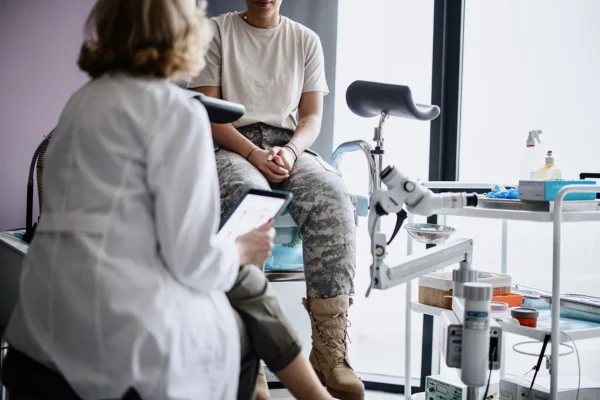Complaint Filed Against Intuit and HireVue Over Biased AI Hiring Technology That Works Worse for Deaf and Non-White Applicants
DENVER – The American Civil Liberties Union, Public Justice, Eisenberg & Baum, LLP, and ACLU of Colorado filed a complaint with the Colorado Civil Rights Division and the Equal Employment Opportunity Commission (EEOC) against financial software company Intuit, and HireVue, a vendor of human resources assessment software using artificial intelligence (AI), on behalf of D.K., an Indigenous and Deaf woman, who was denied a promotion on the basis of her disability and her race. The complaint alleges that the companies violated the Colorado Anti-Discrimination Act (CADA), the Americans with Disabilities Act (ADA), and Title VII of the Civil Rights Act by using biased AI technology in hiring, resulting in systemic discrimination.
D.K. is an Indigenous and Deaf woman, who is currently pursuing a master's degree in data science. She communicates using American Sign Language (ASL) and speaks English with a deaf accent. Since 2019, D.K. has held seasonal roles for Intuit, receiving positive supervisor feedback and bonuses every year.
In the spring of 2024, D.K. was encouraged by her supervisor to apply for a seasonal manager position at Intuit, but was forced to use HireVue’s video interview platform, which features automated speech recognition systems to generate transcripts of applicants’ spoken responses from video interviews. These types of systems are known to perform worse for non-white and deaf or hard of hearing speakers who may have different speech patterns, word choices, and accents. D.K. requested and did not receive an accommodation. She was later rejected for the position and received feedback telling her to work on “effective communication,” to provide “concise and direct answers,” to adapt her “communication style to different audiences,” and to “practice active listening.”
“My experience reflects the systemic discrimination built into AI-driven hiring tools that continue to exclude and disadvantage marginalized communities. Deaf individuals, Indigenous professionals, and countless others should not have to fight for fair treatment in the workplace, especially in an era where technology is shaping hiring decisions,” said D.K. “Companies like Intuit and HireVue must be held accountable for deploying flawed and exclusionary technology that creates artificial barriers for qualified candidates.”
“Research shows that the type of technology underlying HireVue’s system is often unable to accurately recognize and analyze the speech of a deaf applicant, resulting in lower scores. The technology also struggles with non-white applicants, including Indigenous English speakers, whose speech patterns may differ from white applicants,” said Vedan Anthony-North, Marvin M. Karpatkin Fellow with the ACLU's Racial Justice Program. “Applicants should not lose critical job opportunities because of employment assessments that screen them out based on who they are and not whether they can do the job.”
Intuit was aware of the limitations of automated speech recognition technology like the kind used by HireVue and its adverse impact on deaf employees. While D.K. had received high scores on performance measures during her time working at Intuit, she received artificially low scores on metrics stemming from automated speech recognition systems. However, rather than fix the problem, Intuit reassigned D.K. so that she no longer answered customer phone calls and instead only communicated with customers through a chat application, even though she had received positive feedback from customers who spoke to her on the phone.
“Employers have a legal obligation to thoroughly vet any assessments they use to ensure that they are accessible and comply with anti-discrimination laws,” said Shelby Leighton, senior attorney with Public Justice. “Intuit knew HireVue’s technology was flawed and unfair to deaf applicants like D.K., which is a clear violation of discrimination laws.”
“Companies cannot hide behind artificial intelligence to avoid responsibility for discrimination. Eisenberg & Baum is dedicated to challenging technologies that systematically marginalize Deaf, disabled, and Indigenous individuals. We will continue fighting to ensure AI-based hiring tools meet the highest standards of fairness and inclusivity,” said Andrew Rozynski and Sheryl Eisenberg Michalowski, co-directors of the Eisenberg & Baum Law Center for Deaf and Hard of Hearing, in a joint statement.
“It is no surprise that artificial intelligence can deepen racial inequities and inequities for people with disabilities based on the way those programs are developed. The faulty technology at issue here is no exception,” said Tim Macdonald, ACLU of Colorado legal director. “As these tools and practices become more widespread, those that commission them must take great care to ensure that they treat all people fairly and do not exacerbate systemic biases in employment.”
“Real change is necessary. Companies must stop using AI hiring tools that discriminate against disabled and non-white applicants, implement accessible and fair hiring practices, and ensure that all candidates are evaluated based on their skills, experience, and potential, not the biases baked into technology,” D.K. added. “Businesses are on notice that they are responsible for the discriminatory impact of hiring tools. It’s time for action, accountability, and justice.”
A copy of the complaint can be found here.


